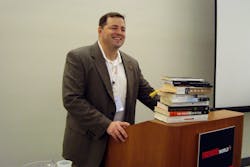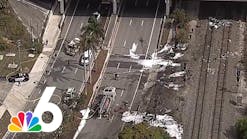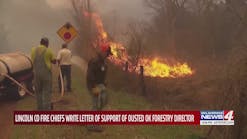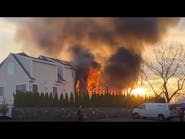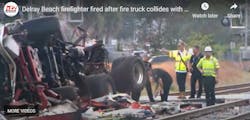SAN DIEGO – There are some firefighters who don’t believe in reading for professional development and Eric Nurnberg, a battalion chief from Iowa City, Iowa, wants to change that.
Nurnberg, who is also the strategic plans officer for Leadership Under Fire, Inc., presented a lecture at Firehouse World in San Diego on Thursday titled “Books That Could Save Your Life.”
“There are some places if you carry a book to work and want to talk about it, they’ll tell you ‘throw your books at the fire and see how fast it goes out,’” Nurnberg said.
He said firefighters are not traditionally thought of as an intellectual group of people, but that needs to change.
“We need to get to a point, seriously, where we need to promote more intellectualism in this business,” Nurnberg said, adding the military has a reading list and began embracing books and reading as a way to pass along lessons.
“We’re not there yet,” he said. “But, we’ve got all this Underwriters Laboratories and NIST (National Institute of Standards and Technology) coming at us. Things are getting shaken up and we need to find a common foundation.”
That foundation, he said, could be an interesting dialog about books that he recommended. He added that it’s next to impossible to teach the contents of one book, never mind a stack of them, in an hour and a half conference class.
“My intention is to introduce you to a reading list for you to stuff your nose into,” he said.
There are many reasons why firefighters, and the general public for that matter, don’t read and topping the list is lack of time.
“I get it, life is super busy,” Nurnberg said. Yet, it is incredibly important to learn lessons from the experience of others and one of the best ways to do that is to read books with powerful lessons and messages.
Nurnberg flashed an image on the large screen in the front of the room on it was a quote by Ben Franklin, “Experience is a clear teacher, but fools will learn at no other."
As a firefighter himself, Nurnberg said he understands the value of hands-on training and experience, however, some of the core knowledge all firefighters should have can be found in books.
Nurnberg mentioned several books by title and author including “Boyd: The Fighter Pilot Who Changed the Art of War,” by Robert Coram; “Certain to Win: The Strategy of John Boyd Applied to Business,” by Chet Richards; “MCDP 1, Warfighting,” U.S. Marine Corps; “The Mission, The Men, and Me: Lessons From a Former Delta Force Commander,” by Pete Blaber; “Deep Survival: Who Lives, Who Dies, and Why,” by Laurence Gonzales; “Everyday Survival: Why Smart People Do Stupid Things,” by Laurence Gonzales; “The Power of Intuition: How to Use Your Gut Feelings to Make Better Decisions at Work,” by Gary Klein; “Outliers: The Story of Success,” by Malcolm Gladwell; and “FirePsyche,” by Dr. Mike Asken and Nurnberg himself.
Nurnberg offered snippets of wisdom from each book like the “Ooda Loop” from “Boyd.” He said it is a decision cycle of observe, orient, decide and act. He added the loop is supposed to go rapidly and repeatedly until the situation is resolved.
He said the Warfighting book by the Marines could very well be called Firefighting and he described it as an easy read that’s free as a download from the government.
Nurnberg, who is a former Marine, said many of the military books offer good lessons that firefighters can use.
“We’re not warriors,” he acknowledged. “We’re not fighting a force with an independent will. But, we are fighting in an environment that is very similar.”
From the book “The Power of Intuition,” Nurnberg said it was a book written after studying firefighters and how they made decisions under stress. The author was stunned when he learned that firefighters most often picked only one option and executed it.
“They got to the fire, they looked at what they were dealing with and made a decision,” Nurnberg said, adding the firefighters and officers knew intuitively what to do without consciously considering options.
He added that firefighters have intuitive experiences and training that help them make decisions without really deeply thinking about it.
Nurnberg encouraged attendees to read for professional development just 10 minutes a day and he said they’d be surprised at how much they’ll learn.
More importantly, Nurnberg said he hopes to have the chance to have a class with students who read the books on his list and engage in a dialog that will benefit the fire service.
“Nobody wants to be the talking head guy,” Nurnberg said. “But, we are going to be most effective and increase survivability by engaging with one another and learning from the experience of others by reading.”
Full Coverage of Firehouse World:
- Photos: Hands-on Training
- Science Needs to Be Incorporated in Modern Firefighting
- Competent Command Essential at Incidents
- Innovative Apparatus on The Show Floor
- Firefighters Face New Challenges Daily
- Eisner Remember, Change Discussed at Firehouse World Opening
- Photos: Day 2 of Firehouse World
- Officers Reminded to Spend Time with Rookies
- A West Coast Versus East Coast Debate
- Photos: Day 3 of Firehouse World
- Fire Service Tradition Is Challenged by Progress
- Hash Oil Labs Create Danger
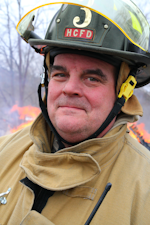
Ed Ballam
Ed Ballam served as associate editor for Firehouse. He is the assistant chief of the Haverhill Corner, N.H. Fire Department, and a National Registered EMT. He is also a Deputy Forest Fire Warden for the New Hampshire Division of Forests and Lands. Professionally, he's been a journalist for over 35 years working for a variety of publications, including employment as managing editor of a national fire service trade journal for more than a decade.
